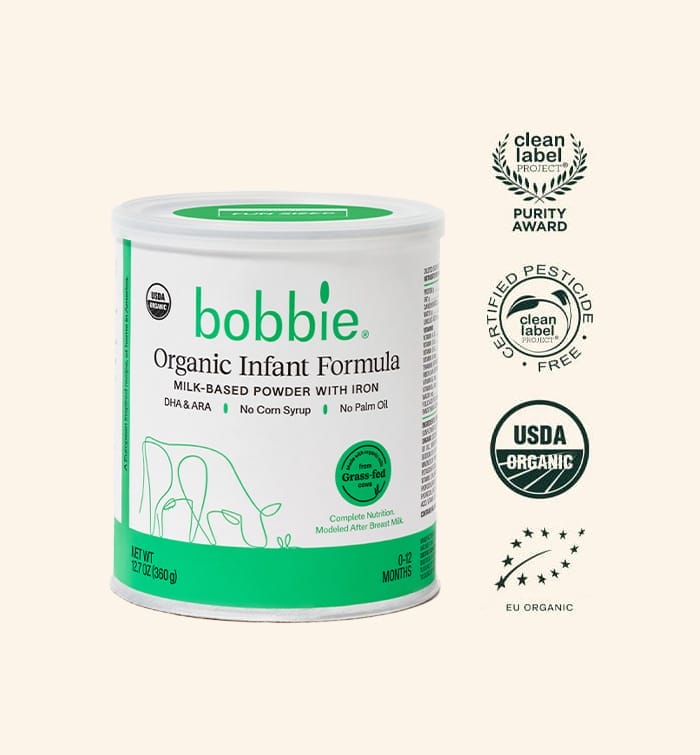We are proud to say that these posts are not sponsored. Our editorial team of Bobbie moms and writers personally select each featured product. If you buy something through our links, we may earn an affiliate commission, at no cost to you.
Our Pediatrician & AAP Spokesperson: Dr. Amna Husain
Hi! My name is Dr. Amna Husain. I’m a board-certified pediatrician, board-certified lactation consultant, and mom to two girls. I own a pediatric practice in New Jersey and also serve as an American Academy of Pediatrics media spokesperson. I love being able to connect with families on the parenting challenges we face today, educating and empowering them with knowledge and evidence based pediatric and breastfeeding medicine. I love that my job allows me to connect with families not only within the exam room, but on a broader scope, impacting thousands more especially in this difficult time of misinformation.
7 Common Questions for Pediatrician and Lactation Consultant
1. I’m not able to get pump breaks at work – is combination feeding bad for baby or is it okay to supplement with baby formula?
You can and absolutely should advocate for pumping at work and if you work within the US, then it is your right. No, it should not be in a bathroom stall!
And it’s ok to supplement with baby formula. There is no right age that formula is best for. Formula is life-saving and can be a form of nutrition for infants from day one of life.
2. How do you treat dry baby skin? Are there home remedies for baby dry skin?
I like to keep baths on the shorter side, use warm or lukewarm water, and moisturize within 2 to 3 minutes of getting out of the bath with Ceramide containing cream.
3. Is there a best way to take baby temperature?
In the newborn, rectal temperatures are the gold standard. Thereafter, I prefer an axillary digital thermometer, taken under the arm. To do this, hold the small end of the thermometer under the child’s armpit and wait for the digital thermometer to beep.1 I find that the forehead or temporal thermometers are never consistent. They can also vary by a lot of factors- wearing a hat, sweat, hair in the face, etc.
4. Should I be concerned about baby falling off growth curve or is there a point they settle?
Most rapid growth is from newborn to three months. Infants put on or should put on a certain number of ounces per day whether they are formula fed or breast fed. That trajectory does start to slow down after three months of age and definitely after 2 years of age, as your child continues to get older. So, growth velocity is a little less rapid after one year of age.
5. What are the best first solid foods for baby?
I personally like to start with veggies. You can also do oatmeal cereal— one of my favorites— with breastmilk or formula stirred in. I’m not a big fan of the old-school rice cereal. Personally, I recommend doing veggies before fruit so the pallet doesn’t become accustomed to preferring sweets only.
6. Pumping and breastfeeding – Should I still pump if the baby only feeds from the breast?
Continuing to pump depends on your needs! This is what you would do if you are triple feeding— which is often recommended if baby is low in weight, premature, or not gaining sufficient weight. If baby is gaining fine, pumping after may create an oversupply which comes with issues, too.
7. Breastfeeding and eczema – Can breastfeeding protect my baby from developing eczema or food allergies?
There are a really limited number of studies that examine the impact of breast-feeding and the development of food allergies. The results are often affected by other varying habits like the length and extent of exclusive breast-feeding plus the presence of eczema and asthma. What we do know is that breast-feeding can significantly lessen the risk of eczema and we know that severe eczema is a risk factor for food allergy development.

Shop Bobbie Organic Infant Formula
Bobbie Organic Infant Formula is a USDA Organic, EU-style infant formula that meets all FDA requirements. It is a complete nutrition milk-based powder modeled after breast milk and is easy on tummies. It is non-GMO and doesn't have corn syrup, palm oil, or maltodextrin. Learn more about Bobbie.
Amna Husain, MD, FAAP, IBCLC, is a board certified pediatrician and Bobbie Medical Advisor.

